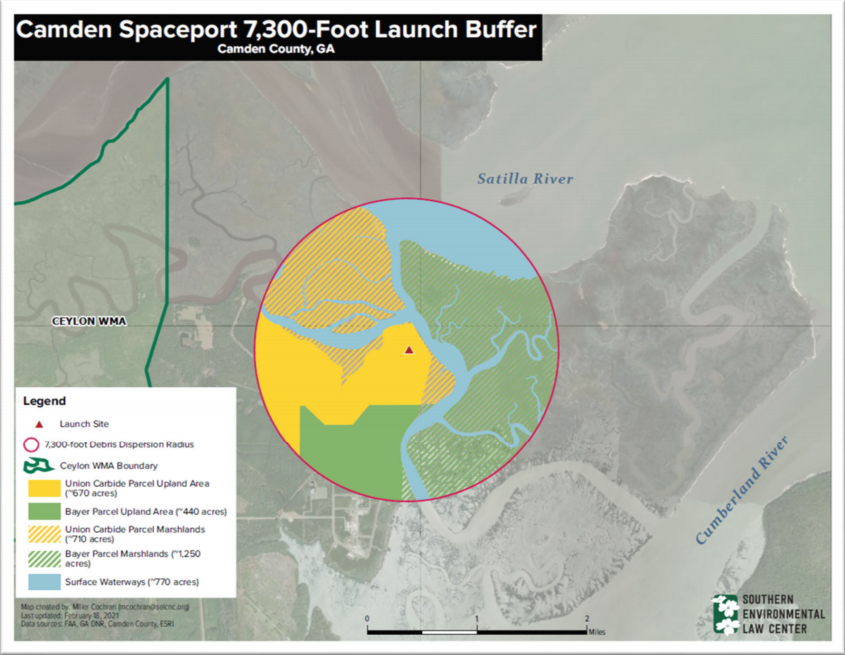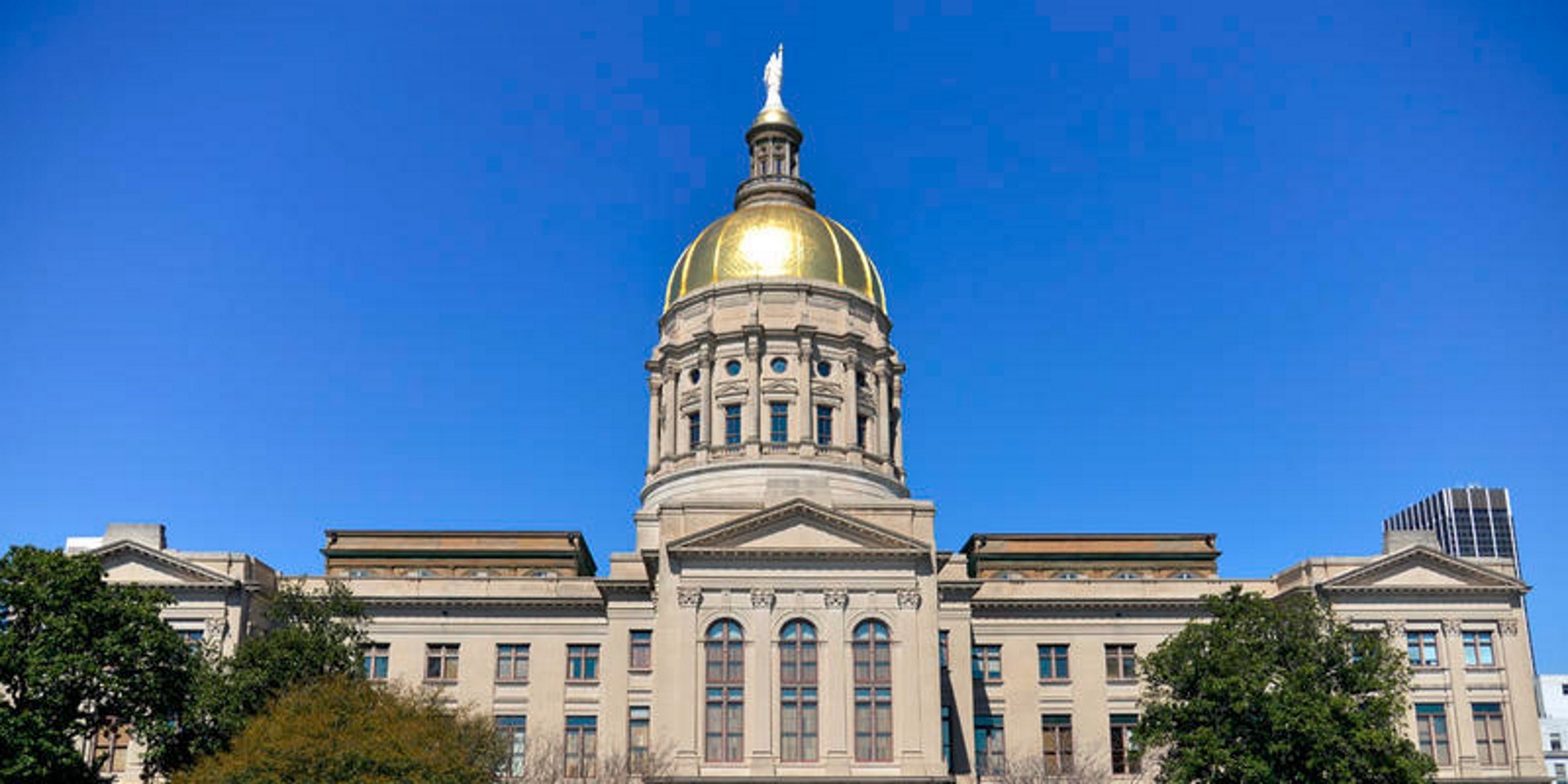State Requests More Time For Spaceport Camden Review; County Hires Former Kemp Aides

The Georgia Department of Natural Resources has asked for more time to review a spaceport project proposed in Camden County. This is a map of rocket debris in a flight analysis of 100,000 simulated rocket launch failures that was included in a memo written by a Camden County consultant.
Spaceport Camden,
Updated at 5:20 p.m. Friday
The Georgia Department of Natural Resources has asked for more time to release an impending decision about a proposed spaceport in South Georgia’s Camden County, citing among other reasons, “the complexity of the proposed project.”
The state agency is required to review whether the proposal violates any Georgia laws protecting the coastal environment.
Camden County is proposing to build a commercial spaceport on the coast in Woodbine, Georgia, featuring a rocket launch trajectory over salt marsh and tidal waters, as well as the Cumberland Island National Seashore. A spaceport operator license would not allow the county to actually launch rockets; each launch would still require an additional federal license.

Steve Howard, Camden County’s administrator, said he is not concerned about the prospect of a delay.
“These are complex issues,” he said of the project. “Comment periods get extended … it’s not out of the ordinary that this would happen.”
“I feel comfortable, confident with where we’re at,” he said.
The Southern Environmental Law Center has estimated more than 2,600 acres of state-owned marsh and waters fall within the rocket debris field proposed by the county, about 70% of the area.
The Department of Natural Resources (DNR) received more than 1,700 public comments about the spaceport in recent months that it must review before granting its “concurrence or objection” on the project. Many of the comments were form letters, but almost all were in opposition to the project.
DNR’s target deadline for a response had been April 11, but the state asked for a few extra months, up to June 30, according to a letter obtained by WABE. The state wrote to the FAA and Camden County that it may need more time because of “various delays” including an unfinished historic preservation review process, as well as the “complexity of the proposed project.”
New Lobbyists
This comes as Camden County has hired two former top aides to Gov. Brian Kemp for “Georgia Government Affairs” work. The county began paying Live Oak Public Strategies in February, a new company registered to Tim Fleming, Kemp’s former chief of staff, and Charles Harper, Kemp’s former deputy chief of staff, who are both registered lobbyists in Georgia.
Howard declined to comment on why Live Oak had been hired and whether their work has anything to do with the Department of Natural Resources. “They have an ability to do a variety of things,” Howard said.
Live Oak becomes the sixth lobbying or advocacy firm the county has paid related to the spaceport this year, but Howard would not discuss the specific activities of any of those firms, or whether they are all, in fact, lobbying for Camden County.
“There are differences in lobbying, advocacy and a variety of other things,” he said. “I can’t get into the specifics because they’re not equal.”
“With any project, you have to have subject matter experts in a variety of fields, whatever project it is,” Howard said.
“There’s a variety of needs that you have,” he said. “This is not a typical project. We’re not building a park. We’re not building a one-lane or a two-lane highway.”
The Spaceport License
Since the county formally began the licensing process in 2015, a slew of federal and state agencies have been involved in the county’s spaceport licensing process, which is led by the FAA.
The license review was delayed in late 2019 after the county decided at the last minute to revise its spaceport operator license application to only small rockets, as opposed to the medium to large ones it had originally proposed. As a result the county has had to redo part of the regulatory process, but a planned additional public comment period has been scrapped.
“I think, for our process, we’re at the right place, right time,” Howard said, about the state of the commercial space industry.
He said Camden is having “conversations” with five launch operators, five satellite manufacturers, two development groups and several technology companies about the spaceport proposal.
“It’s never been about launching the rockets. That’s the catalyst. What the project’s all about is everything else,” Howard said. “The spaceport allows for bigger business opportunities.”
The FAA did not respond to a question from WABE about whether the decision from DNR will impact its projected licensing timeline. The environmental review is currently targeted to end June 18.
In a statement, an FAA spokesperson said the agency “will continue to provide public awareness of the project status as the process progresses” and that the FAA “is in ongoing consultation with the Georgia State Historic Preservation Office and the Advisory Council on Historic Preservation as part of the Spaceport Camden environmental review process.”
Concerns And Questions
Throughout the licensing and environmental review process, several agencies have asked questions and raised concerns about Spaceport Camden, including those state and federal historic preservation agencies, the National Park Service and the Navy. Federal laws require these agencies to review the project for possible impacts.
As the county is proposing to launch rockets over the Cumberland Island National Seashore and some of the private homes that lie within it, the National Park Service has had strong thoughts about the project, including 2018 comments saying it would “directly, indirectly, and cumulatively adversely affect” the park.
In December 2020, the agency wrote to the FAA that it did “not concur” with the FAA’s analysis of how the spaceport may affect the National Seashore. The Park Service wrote it “believes there is a significant risk to Cumberland Island National Seashore that is not adequately addressed” in the FAA’s evaluation. The Park Service said it’s worried about a spaceport’s effects on possible closures of the park during launches and in terms of noise and light.
The Navy, which operates Naval Submarine Base Kings Bay about 10 miles away from the proposed launch site, has previously expressed concerns about the project, related to how a spaceport’s operations might interfere with national security and Kings Bay’s military training and vessel movements.
Unlike other federally managed spaceports that lie near or on military bases such as Cape Canaveral, the spaceport in Camden County would be a fully commercial operation.
More recently, the Navy asked detailed questions of the county regarding possible launch failures’ impacts on the operations of the submarine base, which a Camden County consultant answered in an October letter. The county’s consultant assured the Navy that “it is possible to reduce the chance of debris in the vicinity of NSB Kings Bay to near zero.”
The Navy did not respond to questions about its current perspective on the project by deadline.
As part of a federally mandated historic preservation review process, both the Georgia Historic Preservation Division and the national Advisory Council on Historic Preservation have also been asked to weigh in on the project’s possible effects on historic properties. Among the structures and sites in question are the First African Baptist Church on Cumberland Island and a lighthouse on Little Cumberland Island — two structures listed on the National Register of Historic Places that lie beneath the proposed rocket trajectory.
In December, both the state and federal historic preservation agencies requested that the FAA reevaluate its historic preservation review and asked for more information. The agencies asked the FAA to consider further effects of rocket failure and wildfire on a larger area around the spaceport, including historic properties on Cumberland Island and Little Cumberland Island.
In response, the FAA told both historic preservation agencies that it stands by its previous safety analysis, that the smaller rockets proposed would meet safety requirements for human casualties and said its analysis is sufficient to assess the vulnerability of the historic properties the agencies raised concerns about. The FAA also confirmed that there is not an “inherently greater probability of launch failure” for small launch vehicles, contrary to past reports from the agency.
“Part of the process, too, is, you know, questions are raised,” Howard said about the ongoing licensing process. “Concerns are raised sometimes, but I think it allows an opportunity for that, that dialogue and communication.”
Correction: The previous version of this article inaccurately described the first photo. It has been updated.








